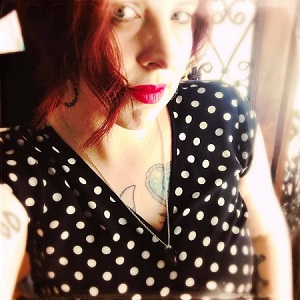Poetry Month Spotlight
Jessie Lynn McMains on the Poetry of Daphne GottliebIf it weren’t for Daphne Gottlieb, I wouldn’t be a poet.
That sounds hyperbolic, but it’s true. Okay, I might have been a poet even if I’d never read her work but my poems wouldn’t be as brave. Since the summer of 2001, when I bought Why Things Burn at Quimby’s in Chicago, her poems have given me a map for writing about the hard things—rape, addiction, mental illness—right alongside poems in praise of love, desire, rebellion. (But hard love, desire like a car crash, rebellion because you’d die otherwise; which is the way I’ve always experienced those things.) For eighteen years her poems have taught me ways to write the truths of how women, queer folks, and other non-normative bodies move through the world. How we armor ourselves, adorn ourselves. How we survive and find joy.

Daphne’s poems often involve an insertion of herself/the speaker into pop culture, history, or the literary canon. Much like Kathy Acker did in her prose (Daphne was a recipient of the Acker Award for Excellence in the Avant-Garde), taking source texts from the canon and making her hero(ine)s pirates and knights, Gottlieb’s poems ask: why can’t a girl be an outlaw, an adventurer, the author of her own story? Why can’t a girl be a Sal Paradise or Dean Moriarty, rather than just a Camille or Marylou?

Daphne’s poems aren’t easily categorized. Her work blends elements of performance poetry and “academic” poetry (as her official website bio states: “[Gottlieb] stitches together the ivory tower and the gutter just using her tongue”). Form-wise, her poems run the gamut from a more traditionally structured lyrical style to prose poems and other experimental forms. (I once nearly got into a bar fight with a dude who dismissed her entire oeuvre because she writes prose poems, and he said, “prose poems aren’t really poetry.”) So this is another thing Daphne has taught me—how to use my words as a bridge between school and street, stage and page. How to be both glitter and gutter, simultaneously.
Here’s a hard truth—sometimes people like us and those we love don’t survive. But maybe more than anything else, Daphne’s poems have shown me that I can use words to give my ghosts breath. Poems can be houses for the dead to inhabit, and every time someone reads those poems, they are again briefly, gloriously, alive.

About Jessie Lynn McMains
Jessie Lynn McMains is a poet, writer, and publisher. They are the author of multiple chapbooks, most recently The Girl With The Most Cake and forget the fuck away from me. You can find their personal website at recklesschants.net, or follow them on Tumblr, Twitter, and Instagram @rustbeltjessie


BMP Celebrates National Poetry Month — Break Poetry Open
For this year’s National Poetry Month, Brain Mill Press & Voices want to add to your #TBR pile, sing siren songs of unsung heroes, and signal boost living poets we should be reading more. By the end of the month, we hope you will have acquired 30+ new books of poetry and that they continue to multiply in the darkness of your library. Explore new voices & new forms — re-read some old favorites — play if you liked this poet, you’ll like... the old-fashioned way, algorithm-free — just poetry lovers talking to poetry lovers, as the Universe intended. Happy #NaPoMo2019 from Brain Mill Press.
